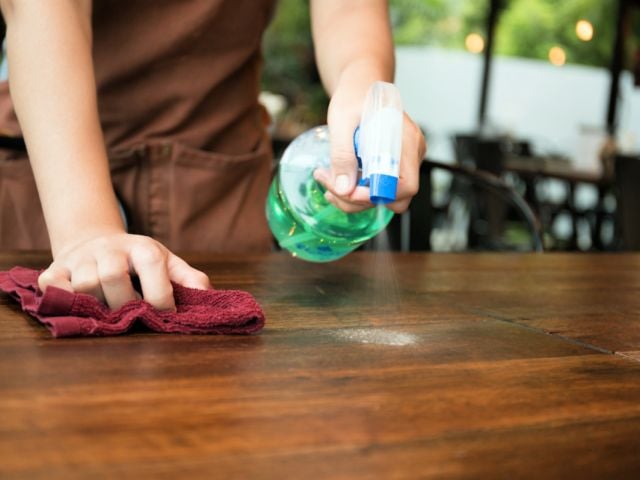SACRAMENTO, Calif. – In a major victory toward safer cleaning products in the marketplace, today California lawmakers approved legislation to require manufacturers to disclose the ingredients in home and commercial cleaning products. If Gov. Jerry Brown signs the bill, California would join New York as one of only two states with cleaning products disclosure laws.
The Cleaning Product Right to Know Act, by state Sen. Ricardo Lara, D-Bell Gardens, would require ingredients – particularly hazardous chemicals, including those used in fragrance mixtures – to be listed on both product labels and online. It would not require disclosure of the concentrations of these ingredients, or how the product is formulated and processed.
“California will be the first in the nation to clear the air for consumers and workers about what is in their cleaning products,” said Sen. Lara. “Consumers are demanding transparency and the Cleaning Product Right to Know Act will set a strong national standard. Consumer advocates and manufacturers worked together to disclose potentially harmful ingredients while allowing businesses to protect proprietary information and retain some flexibility.”
The legislation enjoys the support of long time advocates for cleaning product ingredient disclosure like Seventh Generation and The Honest Company, as well as the industry trade association -- the Consumer Specialty Products Association.
“Consumers and professional cleaners will be able to breathe easier knowing the ingredients in their household and industrial cleaning products,” said Bill Allayaud, EWG's California director of government affairs. “The demand for transparency is growing, as people, workers and business owners want to make informed decisions about the cleaning products they choose to purchase and use.”
Until now, consumers and public health agencies have been left in the dark by labeling requirement loopholes that have allowed manufacturers to hide allergic and even carcinogenic ingredients in their cleaning products. Many manufacturers make it difficult, if not impossible, for consumers to learn what ingredients are in products, because they don't want shoppers to know that their products contain chemicals that can cause reproductive problems, exacerbate asthma, burn or irritate skin, and harm the environment.
A Groundbreaking Bill
“Consumers are increasingly demanding information about the ingredients in their products, and this is especially true for cleaning products. Breast cancer survivors and new and expecting moms, in particular, work extra hard to avoid chemicals that could contribute to a re-occurrence of cancer or negatively impact the healthy development of their children” said Nancy Buermeyer, senior policy strategist for Breast Cancer Prevention Partners. “This groundbreaking bill will help consumers make educated decisions about their purchases and avoid harmful chemicals.”
“This is truly a breakthrough! For the first time ever companies will be legally required to disclose ingredients in fragrance,” said Jamie McConnell, director of programs and policy at Women’s Voices for the Earth. “But passing SB 258 isn’t simply about listing ingredients – it’s about eliminating the barriers that prevent women and men from having the information they need to avoid concerning ingredients like powerful allergens, or synthetic musks linked to breast cancer, or known hormone distruptors like phthalates – all of which can be found in fragrance. Calling this bill a game-changer is an under-statement. This is going to change lives.”
Even cleaning products advertised as “green” or “natural” may contain ingredients that can cause health problems. Manufacturers can use almost any ingredient they choose, including known carcinogens, and substances known to pose health or environmental hazards.
“We all have the right to know the ingredients in the products we bring into our homes that could affect our health,” said Avinash Kar, a senior attorney with the Natural Resources Defense Council. “That’s why consumers overwhelmingly support ingredient disclosure. The cleaning product industry recognized this consumer demand and worked with our coalition to craft a solution in Sen. Lara’s bill. This bill will put California, once again, at the forefront of public health protections.”
New York passed a cleaning products disclosure bill in 1971, but inexplicably never implemented it. After pressure from environmental and consumer groups, the New York Department of Environmental Conservation is currently working on guidance to manufacturers on how to comply with the law. With the two largest states mandating disclosure, some companies will likely reformulate their products to remove ingredients of concern.
Federal regulations do not require manufacturers of cleaning products to disclose their ingredients on product labels. In the absence of legislation, some companies like Proctor & Gamble, SC Johnson and Unilever have voluntarily provided detailed information on fragrance ingredients. But without mandatory disclosure, most companies resist calls to list all ingredients and use the term “fragrance” to hide hundreds of chemicals, including known allergens, on the grounds that they are obligated to protect the trade secrets of their fragrance suppliers.
Workers, particularly janitors and housekeeping staff, are exposed to chemicals in cleaning products all day, every day. Women account for 9 out of 10 domestic workers and housekeepers, and of those, a majority are Latina or African American. Cleaning ingredients vary in the type of problems they can pose for workers: some cause acute allergic reactions, while others are associated with chronic or long-term effects such as asthma and cancer. Work-related asthma among California’s janitors and cleaners is nearly double the rate of the overall workforce.
“While research shines light on the harms of secret chemicals used in common cleaning products, very little of this information makes its way to domestic workers, like house clearners, who are the most exposed. Domestic workers deserve the right to know and based on that information, hopefully have the ability to leverage the use of better products with their employers,” said Nancy Zuniga of the Institute of Popular Education of Southern California (IDEPSCA). “Commercial cleaning professionals and domestic workers have a right to know what’s hiding in these products so they can protect themselves whenever possible in their workplace – their health shouldn’t be compromised for the work they do.”
“Every day consumers are exposed to chemicals commonly found in products used to clean and disinfect their homes, cars and offices,” said Mayra Soto of Pacoima Beautiful. “Consumers of all socioeconomic backgrounds have a right to know exactly what chemicals are in the products they are buying for themselves and their children. As the expectation of more transparency continues to skyrocket, this mandatory disclosure will guarantee that consumers and workers will know what chemicals are in these cleaners to better protect their health.”
EWG’s interactive Guide to Healthy Cleaning provides real-time hazard and ingredient information on more than 2,500 products to fill the transparency void, drive the market toward healthier products and empower consumers through education.
# # #
Press contacts:
Beth Conway | Women’s Voices for the Earth | [email protected] | 406-543-3747
Erika Wilhelm | Breast Cancer Prevention Partners | [email protected] | 415-539-5005
Kimiko Martinez | Natural Resources Defense Council | [email protected] | 310-434-2344
About:
The Cleaning Product Right to Know Act was co-sponsored by the Environmental Working Group, Breast Cancer Prevention Partners, Women’s Voices for the Earth and the Natural Resources Defense Council.
The Breast Cancer Prevention Partners is the leading national organization working to prevent breast cancer by eliminating exposures to toxic chemicals and radiation linked to the disease. Learn more at www.bcpp.org/.
The Environmental Working Group is a nonprofit, nonpartisan organization dedicated to protecting human health and the environment. Its mission is to empower people to live healthier lives in a healthier environment. Learn more at www.ewg.org.
The Natural Resources Defense Council (NRDC) is an international nonprofit environmental organization with more than 2 million members and online activists. Since 1970, our lawyers, scientists, and other environmental specialists have worked to protect the world's natural resources, public health, and the environment. NRDC has offices in New York City, Washington, D.C., Los Angeles, San Francisco, Chicago, Bozeman, Montana, and Beijing. Learn more at www.nrdc.org.
Women’s Voices for the Earth is a national environmental health organization that works to amplify women’s voices to eliminate toxic chemicals that harm our health and communities. Learn more at womensvoices.org.



